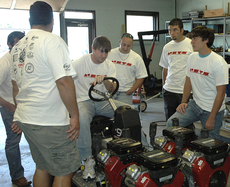Due to the state’s budget cuts to higher education, the University faces the possible elimination of the manufacturing engineering technology program.MET was also threatened in the fall of 2005, five years after it began, by the Board of Regents due to low enrollment and graduation numbers. Support from students, the Student Government Association Senate and local businesses forced the University and Regents to keep the program open.
Terry Dantin, head of the Department of Applied Sciences that oversees the MET program, explained in order for a program to remain at Nicholls, there must be at least eight graduates annually.
Since the program was still new, meeting the University’s graduate expectation was difficult. “You’re not going to have graduates of the program until four years down the line,” Dantin said.
Dantin and George Watt, coordinator for the MET program, believe the negative press of MET’s halted closure in 2005, along with hurricanes Katrina and Rita, hurt student recruitment at a critical time in the program’s development.
“Our student enrollment dropped from the forties down to eleven. So we had to start over,” Watt said. “We didn’t begin recruiting again until 2007.”
The number of MET students increased to nearly 50 students when the University notified the department of its final closure last spring. Chris Authement, senior from Houma and president of Nicholls Engineering Technology Society, explained what he and other students are doing in order to complete their MET degree. “They all gave us one year to take our core curriculum classes,” he said. “Then we can go back and take our general education classes.”
However, some are taking a large class load in order to graduate with a Nicholls degree before the program is shut down. “I am taking 22 hours this semester,” Cody Pellegrin, senior from Chauvin, said.
“I am taking 17 hours, but it comes out to nine classes,” Derek Kash, senior from Patterson, said.
MET at Nicholls is the only program of its kind in Louisiana. Graduates of the program will be qualified for various equipment engineering and management jobs in oilfield, shipbuilding and agricultural industries.
“The stuff in this program is by far what I wanted to do. This program is built for the local economy,” Authement said.
“It isn’t just the mechanical background but also the manufacturing and managerial process knowledge you gain from this degree.” Jake Boudreaux, senior from Raceland, said. “It just caters to what most of the companies want around here.”
“Most of the students who go here are local. With the businesses all around here as well, a student doesn’t have to move away to get an education or get a job,” Beau Martin, senior from Raceland, said.
Dantin, Watt and MET students argued the program has succeeded since it’s opening. Local businesses and organizations support the program through donating equipment, parts, technology and resources. The University provides only the physical space and payment of two professors.
The Accreditation Board for Engineering and Technology gave the program a full six-year accreditation last August. According to Dantin, achieving full accreditation is “almost unheard of for a new program going through its first ever accreditation.”
Every year, a group of Nicholls MET students create and construct a new tractor design to compete in an event in Illinois sponsored by the American Society of Agricultural and Biological Engineers. The tractor must be able to hook or lock, support and pull a designated weight. Students work part-time at local businesses and hold fundraisers to pay for the parts needed, entrance fees and travel fees for the competition. “Nicholls doesn’t even give a dime to help,” Authement said.
Nicholls won first place in the performance category in 2009 and placed sixth overall against much larger universities such as Purdue, Ohio State, Kansas State, Iowa State and Oklahoma State. The MET program’s closure has motivated the students to perform well in 2010. “We work hard in the competition every year to improve on what we’ve done,” Authement said. “To see all that hard work over the past five or six years just stop, we don’t have anything to do now.”
MET students have worked with local businesses that support the program to keep it open. “They wrote some letters and called a few people. We tried with Dantin and Watt to see the president of Nicholls and the board which makes the decisions,” Authement said. “We were always shut down when we tried to make any attempts.”
“It’s sad to see Dr. Watt and the industrial partners try everything to make it work for so many years,” Martin said. “They did everything they asked them to do, and the University still shuts it down. To see Dr. Watt’s face after it happened and see how upset he was, it really pissed me off.








